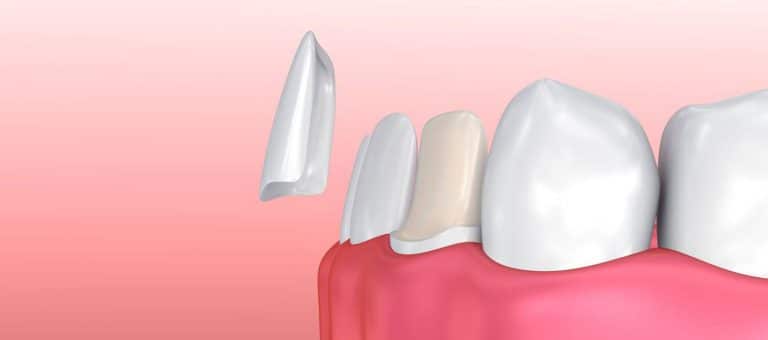Who doesn’t dream of a beautiful, dazzling smile with perfectly aligned pearly whites? It’s a desire that’s become more achievable thanks to widespread access to preventive dental care to keep our teeth in top shape for years.
Dental veneers have emerged as a go-to solution for many in this hunt for the perfect smile. Among the various types of veneers, no-prep veneers stand out for their remarkable suitability, especially when compared to the traditional ones.
Traditional veneers have their benefits and are a fantastic option for those seeking smile transformation. It’s all about finding what suits you best. In this blog, you will learn the difference between no-prep veneers and traditional veneers. However, first, let’s get into some basics about dental veneers.
What Are Dental Veneers?
Imagine dental veneers as thin, custom-made shells that go on the front surface of your teeth, just like a sleek cover. These shells are made to blend seamlessly with your natural teeth, so they look and feel real.
Now, why would you want to get these veneers? They are like a magic wand for fixing different dental concerns:
- Stained Teeth: If your pearly whites aren’t so pearly anymore due to staining, veneers can help restore that bright smile.
- Chipped Teeth: Accidents happen, and sometimes a tooth chips. Veneers can fix those imperfections and make your tooth whole again.
- Crooked Teeth: If your teeth are misaligned, veneers can create the illusion of a perfectly aligned smile.
- Unevenly Spaced Teeth: Gaps between teeth? Veneers can fill those gaps, giving your smile a more even and harmonious look.
There are different types of veneers, including traditional and no-prep veneers, and both can help you fix these dental concerns. So, veneers could be a fantastic option to enhance your smile.
Top Veneer Alternatives for Major Dental Issues
Teeth Whitening
To enhance your teeth’ colour and shade without a significant procedure, teeth whitening could be one the best veneer alternatives. It’s all about improving aesthetics. You can opt for professional dental teeth whitening or over-the-counter whitening kits. The DIY kits may need a bit of commitment, involving wearing retainer-style trays and avoiding certain foods and drinks. Just ensure you use a trusted product to prevent potential dental issues.
Dental Bonding
Dental bonding, or composite bonding, involves applying a plastic filling to your teeth, altering their shape, and enhancing their natural appearance. Unlike veneers, bonding doesn’t require removing enamel from your teeth before application. Dental bonding is an excellent choice to change your teeth’ shape, fix chips, or address minor damage. However, it’s important to note that while dental bonding is effective, it may not have the same longevity or high quality as veneers.
Dental Crowns
Dental crowns are a bit more involved than veneers, requiring a careful surgical procedure for application. However, the good news is that this can typically be done in just one appointment. The process involves shaving off the top layer of your tooth, taking an internal scan of your mouth, and then creating a ceramic crown on the spot. Your dentist port Melbourne then attaches this custom-made crown to the prepared tooth.
Dental Implants
The more invasive cosmetic dental treatments are dental implants. They are an alternative to veneers, although they aren’t usually considered a direct substitute. Dental implants are essential when a tooth is missing or severely damaged. The procedure involves drilling into your gums and bone tissue, placing a screw into the bone, and then attaching a prosthetic tooth to that screw. While this procedure can be done for an entire mouth, typically, 4-6 dental implants are sufficient to hold the teeth in place.
About Traditional Veneers
Traditional veneers, made from either porcelain or composite materials, are permanent dental enhancements. The installation involves careful preparation, removing a small amount of enamel to ensure a comfortable and natural fit.
An impression of your teeth is taken to fabricate the veneers, which are later bonded using dental cement and UV light. These veneers are a long-lasting option, capable of enduring for several years with proper care.
Two Types of Traditional Veneers:
Porcelain Veneers
- Resemble natural enamel in colour and transparency.
- Highly biocompatible and stain resistant.
- Require two dental visits for preparation and placement.
- An excellent long-term treatment option.
Composite Veneers
- Quick and cost-effective compared to porcelain veneers.
- Only one dental appointment is needed, with minimal enamel removal.
- Prone to chipping and staining like natural teeth.
- It lasts up to eight years and can be easily repaired as necessary.
About No-Prep Veneers
No-prep veneers, also known as no-grinding veneers, offer a minimally invasive option for enhancing your smile. Unlike traditional veneers, they require minimal tooth preparation, making them a popular choice among dental patients.
The process involves your dentist taking an impression of your teeth to create custom veneers bonded to your teeth’ front surface. Any necessary alterations usually involve the removal of a small amount of enamel. In most cases, this procedure is painless and does not require anaesthesia unless you have heightened tooth sensitivity.
There are three main types of no-prep veneers:
- Lumineers: Renowned as ultra-thin porcelain veneers without shaving teeth. It provides a natural appearance and can be applied painlessly in a relatively short procedure lasting 1 to 2 hours.
- Vivaneers: Similar to Lumineers, Vivaneers are made of thin porcelain, approximately 0.33 mm thick (similar to the width of a contact lens). They typically require little to no tooth preparation.
- DURAthin: It is a brand that specializes in no-prep veneers. Their thin porcelain veneers can be easily applied without significant tooth alteration, allowing you to maintain your natural smile.
No-prep veneers are convenient and more cost effective than traditional veneers, making them a desirable choice for individuals seeking an improved smile with minimal hassle and expense. With proper care, your no-prep veneers can last up to 20 years.
No-Prep Veneers Pros and Cons
No-prep veneers present both advantages and drawbacks in dental treatments.
On the positive side, these veneers offer benefits such as preserving tooth enamel, a painless and quick procedure, cost-effectiveness, easy removal, lightweight and natural appearance, and no need for temporary veneers.
However, there are also limitations and downsides to consider. No prep veneers are suitable for mild to moderate aesthetic concerns, making them less effective for severe dental issues. Additionally, they may not match the durability of traditional alternatives and have a shorter lifespan, necessitating replacement after a few years.
Differences Between Minimal-Prep Veneers and No-Prep Veneers
Minimal-Prep Veneers
- Material: Typically made from porcelain.
- Tooth Preparation: Involves a minimal removal (a fraction of a millimetre) of tooth enamel for proper alignment and natural fit.
- Procedure: Requires at least two dental visits. The first visit involves tooth preparation and impressions for custom veneers.
- Downtime: Minimal downtime as some tooth enamel is removed, but not extensive.
- Cost: Generally, more affordable compared to traditional veneers due to limited tooth preparation.
No-Prep Veneers
- Materials: Can be made from tooth-coloured composite resin or ultra-thin ceramic shells.
- Tooth Preparation: No alteration of the original tooth structure is required; veneers are directly bonded.
- Procedure: Typically completed in a single visit, you can leave with your new smile immediately.
- Downtime: Virtually no downtime, as there is no tooth preparation involved.
- Cost: Generally, more cost-effective than traditional veneers due to minimal tooth preparation.
Do Teeth Rot Under No Prep Veneers
When correctly bonded and well-maintained, veneers can provide adequate protection against tooth decay. However, ensuring a secure bond between the veneer and your natural tooth is crucial.
In cases where veneers are not securely bonded, there is a risk of bacteria and food particles getting trapped between the tooth and the veneer. If this issue goes unaddressed, it can potentially lead to the development of tooth decay.
Therefore, regular brushing is vital to maintain oral hygiene, especially around the tooth without veneer, to prevent potential decay and maintain overall dental health.
How Are Teeth Prepped for Veneers
Teeth prepped for veneers involves several steps to ensure a proper fit and appearance. Initially, your dentist will clean the surfaces of your teeth and carefully remove a minimal layer of enamel from each tooth.
This process allows for optimal veneer adhesion. Following enamel removal, impressions of the prepared teeth are taken to create accurate moulds. Meanwhile, temporary veneers are placed to protect and maintain the aesthetics of your teeth until a dental laboratory crafts the permanent veneers.
Are No-Prep Veneers Better Than Traditional Veneers
Both cosmetic treatments can achieve a beautiful, even, and white smile. Before proceeding, the knowledgeable team at Dentist Port Melbourne will offer tailored advice to ensure the best outcome for your unique situation.
For those seeking quick, high-quality smile makeover results like the ones featured on our website, porcelain no-prep veneers are the ideal choice. Schedule an appointment with Sydney’s preferred cosmetic dentist, Dentist Port Melbourne.
Get The Most Natural-Looking Veneers in Melbourne
In the discussion between no-prep veneers vs. traditional veneers, it’s crucial to understand your options when seeking the most natural-looking veneers in Melbourne. Porcelain veneers are widely recognised as the benchmark for achieving aesthetically pleasing smiles. However, there are several alternative options, including Lumineers, composite veneers, zirconia veneers, and Emax veneers, all capable of delivering a natural and appealing appearance for dental enhancements. If you want to know more about dental veneers, contact Dentist Port Melbourne at your convenience.












